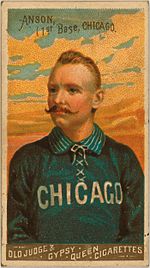Cap Anson, Date of Birth, Place of Birth, Date of Death
TweetCap Anson
American baseball player
 Date of Birth: 17-Apr-1852
Date of Birth: 17-Apr-1852
 Place of Birth: Marshalltown, Iowa, United States
Place of Birth: Marshalltown, Iowa, United States
Date of Death: 14-Apr-1922
Profession: baseball player
Nationality: United States
Zodiac Sign: Aries 
About Cap Anson
- Adrian Constantine Anson (April 17, 1852 – April 14, 1922), nicknamed "Cap" (for "Captain") and "Pop", was an American Major League Baseball (MLB) first baseman.
- Including his time in the National Association (NA), he played a record 27 consecutive seasons.
- Anson was regarded as one of the greatest players of his era and one of the first superstars of the game.
- Anson spent most of his career with the Chicago Cubs franchise (then known as the "White Stockings" and later the "Colts"), serving as the club's manager, first baseman and, later in his tenure, minority owner.
- He led the team to six National League pennants in the 1880s.
- Anson was one of baseball's first great hitters, and probably the first to tally over 3,000 career hits. His contemporary influence and prestige are regarded by historians as playing a major role in establishing the racial segregation in professional baseball that persisted until the late 1940s.
- On several occasions, Anson refused to take the field when the opposing roster included black players.
- Anson may have influenced the most noted vote in 19th-century professional baseball in favor of segregation: a July 14, 1887 one by the high-minor International League to ban the signing of new contracts with black players.After retiring as a player and leaving the Colts, Anson briefly managed the New York Giants.
- He ran several enterprises in Chicago, including opening a billiards and bowling hall and running a semi-professional baseball team he dubbed "Anson's Colts".
- Anson also toured extensively on the vaudeville circuit, performing monologues and songs.
- Many of his business ventures failed.
- As a result, Anson lost his ownership stake in the Colts (by then known as the Cubs) and filed for bankruptcy.
- Anson was inducted into the National Baseball Hall of Fame in 1939.
Read more at Wikipedia


